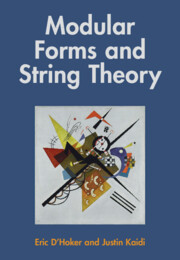Book contents
- Frontmatter
- Dedication
- Contents
- Organization
- Acknowledgements
- 1 Introduction
- Part I Modular forms and their variants
- Part II Extensions and applications
- 10 Hecke operators
- 11 Singular moduli and complex multiplication
- 12 String amplitudes
- 13 Toroidal compactication
- 14 S-duality of Type IIB superstrings
- 15 Dualities in N = 2 super Yang–Mills theories
- 16 Basic Galois theory
- Part III Appendix
- References
- Index
15 - Dualities in N = 2 super Yang–Mills theories
from Part II - Extensions and applications
Published online by Cambridge University Press: 28 November 2024
- Frontmatter
- Dedication
- Contents
- Organization
- Acknowledgements
- 1 Introduction
- Part I Modular forms and their variants
- Part II Extensions and applications
- 10 Hecke operators
- 11 Singular moduli and complex multiplication
- 12 String amplitudes
- 13 Toroidal compactication
- 14 S-duality of Type IIB superstrings
- 15 Dualities in N = 2 super Yang–Mills theories
- 16 Basic Galois theory
- Part III Appendix
- References
- Index
Summary
In this penultimate chapter, we shall discuss dualities in Yang–Mills theories with extended supersymmetry in four-dimensional Minkowski space-time. We briefly review supersymmetry multiplets of states and fields and the construction of supersymmetric Lagrangian theories with N = 1, 2, and 4 Poincaré supersymmetries. We then discuss the SL(2,Z) Montonen–Olive duality properties of the maximally supersymmetric N = 4 theory and the low-energy effective Lagrangians for N = 2 theories via the Seiberg–Witten solution. We shall close this chapter with a discussion of dualities of N = 2 superconformal gauge theories, which possess interesting spaces of marginal gauge couplings. In some cases, these spaces of couplings can be identified with the moduli spaces for Riemann surfaces of various genera.
Keywords
Information
- Type
- Chapter
- Information
- Modular Forms and String Theory , pp. 294 - 331Publisher: Cambridge University PressPrint publication year: 2024
